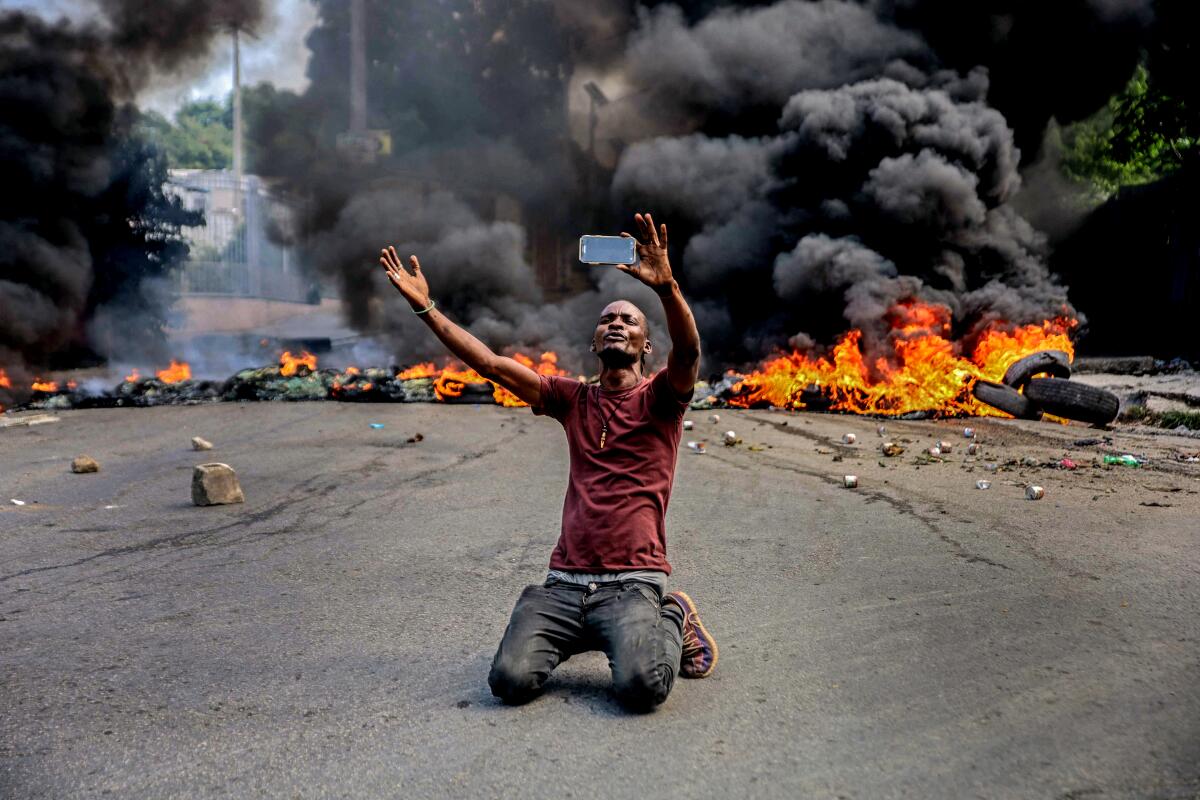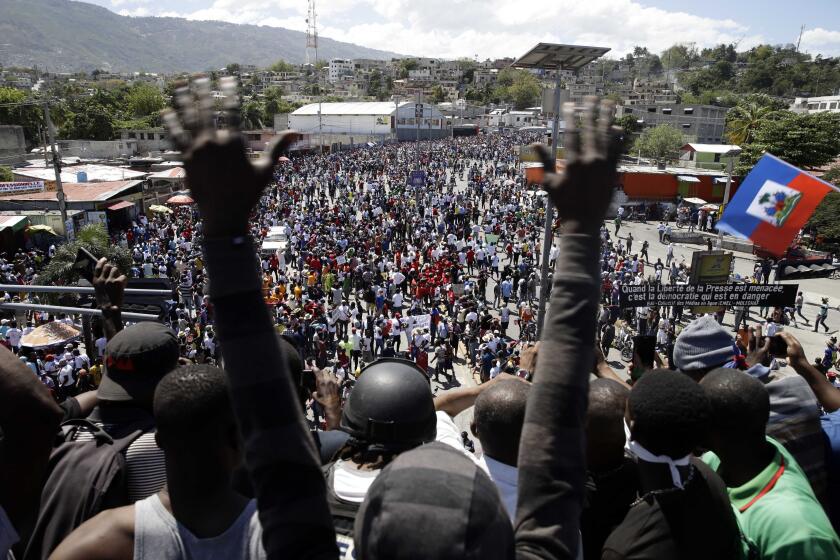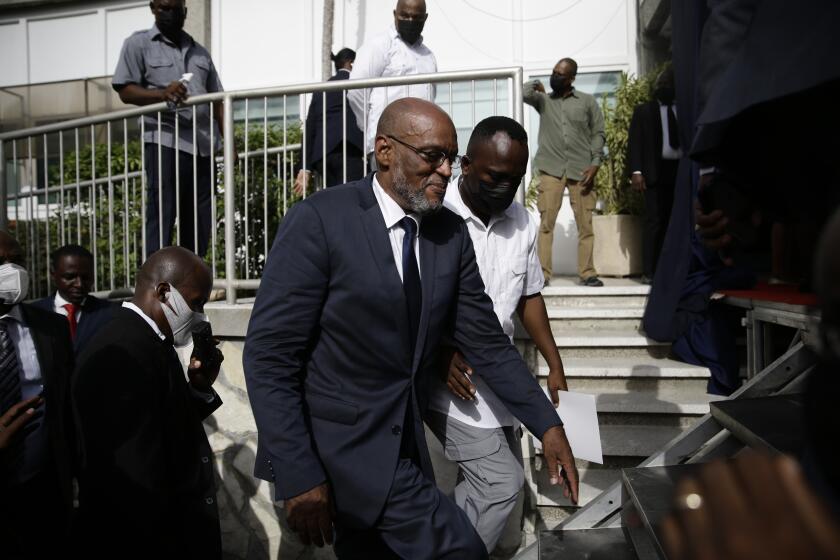Op-Ed: Why Haiti can’t get the new beginning it needs

- Share via
It’s been 36 years to the day since Jean-Claude “Baby Doc” Duvalier, scion of a 29-year dictatorship, fled Haiti in the wake of popular unrest and the loss of U.S. support. The promise of democracy that his flight seemed to augur for Haitians has not been realized.
The aftermath of Duvalierism has instead been a generations-long experiment in misrule, with mostly fraud-filled elections whose results have been fiddled with by outside observers, especially the United States.
Still, every five years since Duvalier left (except for glitches, coups and postponements), Feb. 7 has been inauguration day in Haiti, when a new president takes office and Haitians try to convince themselves to have hope for a better future.
This Feb. 7 should be another such inauguration day, the scheduled end of President Jovenel Moise’s official term and the beginning of something new. But Moise was assassinated in July, and there is no new beginning for Haiti.
If the international community insists on supporting men connected to Jovenel Moise, there will be no free and fair elections in a nation devastated by corruption and poverty.
Moise’s killing is far from solved. Among those who’ve been implicated in the conspiracy one person stands out: the current prime minister, Ariel Henry, who was appointed by Moise but did not take office until days after the assassination, when he was elevated by the U.S. and other international actors into the prime minister’s seat. According to Haitian prosecutors and a New York Times report, Henry was in close and frequent contact with one of the chief suspects in the assassination, Joseph Felix Badio, who is now on the lam.
Henry, however, is still nominally in charge. He has said he wants to take the country to elections as soon as possible. But the Haiti he rules is no country for elections.
A series of U.S.-supported leaders have left the country rudderless, awash in corruption and crime. Fearsome gangs — allied with politicians, drug traffickers and businessmen — rule the streets, armed with imposing, military-style weapons. Kidnapping is a business, run like a business, but messier. Assassinations of journalists and opposition figures are run-of-the-mill events. Street killings go unnoticed. In parts of the capital, Port-au-Prince, gangs fight over turf while the population cowers indoors. Only a month ago Henry himself had to be rescued from a gun battle between his security guards and a bunch of gang members at an official ceremony.
The streets aren’t safe. In such conditions, voters don’t turn out. So no elections.
Instead, the battle for control of Haiti has become a struggle to win the backing of the United States and its international friends, not because they are trusted allies but because they provide the foreign aid necessary for the economy, as well as the potential for technical assistance in disarming the gangs.
Henry heads one faction vying for more permanent control and the blessing of the foreigners. To the Americans, he is appealing because he’s a known quantity. They understand what to expect of him: not much. At least he probably won’t cause new problems.
One leader assassinated, another on the brink of being indicted in the killing. This time, Washington should let Haiti find its own solutions.
Then there’s the progressive Commission for a Haitian Solution to the Crisis. Five months before Moise was killed, this group, disgusted by Moise’s disastrous presidency, gathered representatives of large swaths of Haitian society in an attempt to establish a diverse, competent transition government, counter gang warfare, hold safe democratic elections and steer the country toward functioning self-rule.
The commission has expanded its original membership and cast a wider ideological net to increase its appeal to the United States. Its members hope that just by being there, a positive alternative to the failures of Henry and of what remains of the Moise regime, they may prevail. At the end of January, they calmly and decorously elected a proposed transition president and prime minister.
Seen through the American lens, however, the coalition may appear unpredictable and amorphous, a questionable protégé, although intermediaries have been in sporadic contact with the group.
For now, the U.S. is still with Henry, but that may not last. A sword of Damocles hangs over the de facto prime minister. What the news media calls “potentially incriminating details” about his relationship with the main suspect in the Moise assassination could turn into charges against him, in which case, the U.S. would have to look elsewhere for Haitian leadership.
One other faction could tip this terrible balance — the Haitian people. They can seem powerless and inattentive, until they rise up. Especially on Feb. 7, everyone in Haiti recalls the central role of popular unrest in the fall of Duvalier. Mass protests now over rampant crime and increasingly unlivable poverty could force the international community’s hand and open a plausible path through the morass.
Haitian-American relations have always been about the souls of both nations: about slavery and its legacy, about racial injustice and Black power. The very idea that the U.S. holds sway over Haiti and Haitians, while familiar and undeniable, infuriates many Haitians.
As Haiti passes another anniversary of Duvalier’s fall, its political crisis vividly illustrates the difficulties of moving beyond that history. It’s just not clear that the U.S. has the imagination or the political courage to reinvent its role and to establish a more egalitarian relationship there. Without such change it seems unlikely Haitians will be able to get on with the business of building their own state, a hard enough task even with a reliable partner.
So, alas for Haiti, this Feb. 7, no new president will be inaugurated. And Haitians will remain in a dangerous limbo.
Amy Wilentz is the author of “The Rainy Season: Haiti Since Duvalier” and “Farewell, Fred Voodoo: A Letter From Haiti,” among other books. She teaches in the literary journalism program at UC Irvine and was a 2020 Guggenheim fellow.
More to Read
A cure for the common opinion
Get thought-provoking perspectives with our weekly newsletter.
You may occasionally receive promotional content from the Los Angeles Times.












